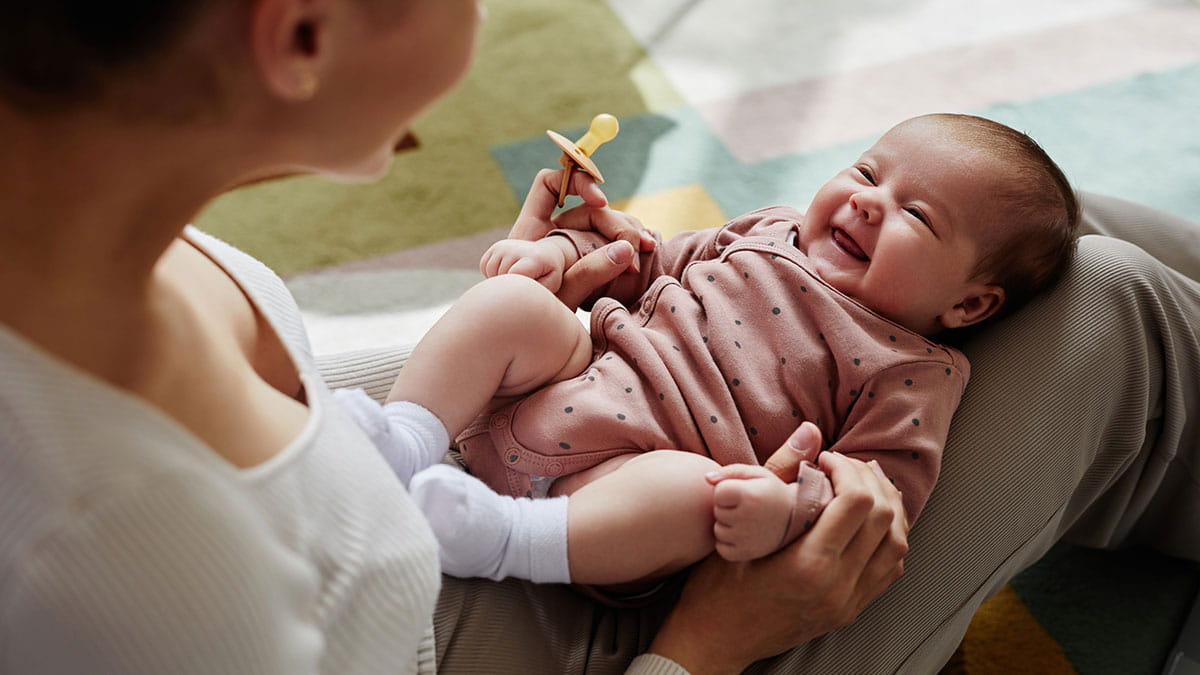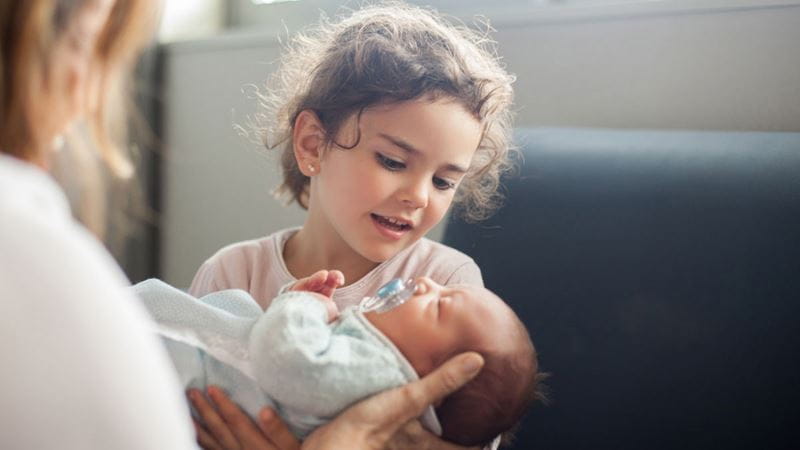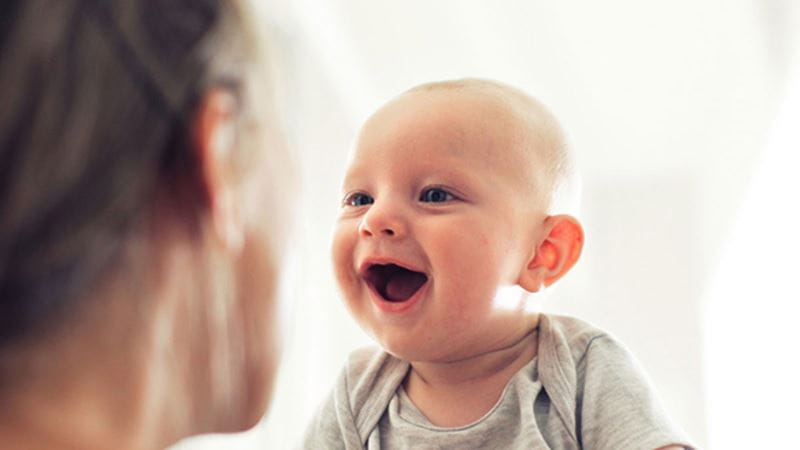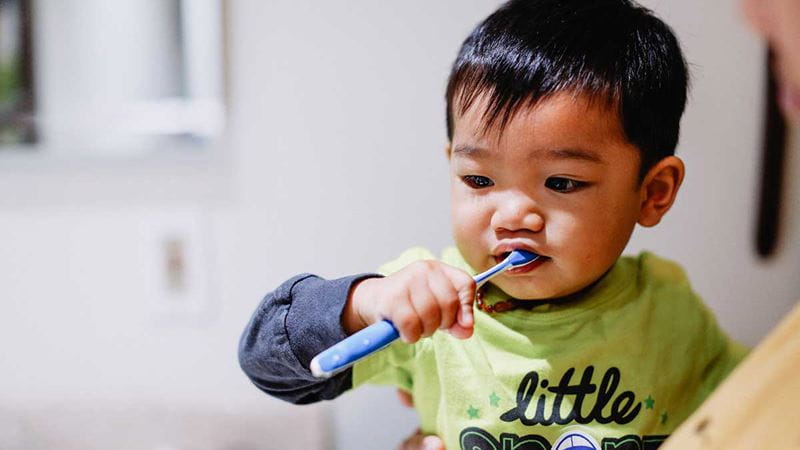Blog article
Understanding your baby’s development: 0-3 months

In just a few short months, your baby will begin to show signs of learning, growing, and responding to the world around them. These early moments are packed with milestones – some obvious, others more subtle – and every baby will reach them in their own time.
In this blog, we’ll walk you through the stages of baby development from birth to three months, including key milestones in movement, communication, bonding and sensory awareness, and when to seek help.
Key areas of early baby development
From birth, your baby is developing in many different ways – physically, socially, emotionally and more. While there’s no universal checklist, it can be helpful to think about development across five areas:1,2,3,4,5
- Physical development (including gross motor skills)
- Cognitive development
- Social and emotional development
- Language and communication
- Sensory development
Every baby develops differently – but recognising changes in these areas can help you feel more connected to what’s happening beneath the surface.
Understanding your baby’s development: Month 1
Your baby is beginning to make sense of the world through reflexes, sound, and touch. Most development at this stage is subtle, but every cuddle, gaze and nappy change supports their growth. During this stage, you can expect to see the following:1,5,6
Physical development: In the first few weeks, your baby’s movements are mostly reflexes. They’ll likely keep their hands in tight fists, suck when something touches their mouth, and show a stepping motion when their feet touch a surface. By the end of the month, many babies can briefly lift their head while on their tummy and turn it to one side.
Cognitive development: Your baby is starting to focus both eyes on the same object and may follow a slow-moving object with their gaze. They’re already learning about the world by watching and listening.
Social and emotional development: Most babies prefer to look at human faces over objects and will begin to recognise familiar caregivers. Holding your baby about 45cm from your face gives them the best view – and they may respond with long, searching gazes.
Language and communication: Crying is still the main way your baby communicates, but they may also start to make soft gurgling or cooing noises, especially when calm or content.
Sensory development: Your baby will start responding more noticeably to sounds, including your voice, and may be startled by loud noises. They’re also beginning to explore touch and smell, which helps them feel comforted and secure.
Understanding your baby’s development: Month 2
At two months, your baby is starting to become more aware of you, their body, and their environment. Smiles are more frequent, and their movements are becoming smoother and more coordinated. Here are some of the key changes you might notice during this stage:1,5,7
Physical development: Your baby’s movements are becoming smoother and more coordinated. They may start to open their hands more often, clasp them together, or swipe at nearby objects. During tummy time, they might lift their chest off the ground, showing growing neck and upper body strength.
Cognitive development: Attention spans are improving. Your baby might follow a moving object past the centre of their vision (called the midline) and enjoy staring at patterns or colourful toys.
Social and emotional development: By 2 months, many babies begin smiling in response to faces and voices. They’re more alert during the day and may sleep for longer stretches at night. They’ll recognise you and may calm more easily when you comfort them.
Language and communication: Gurgling and cooing becomes more frequent, and babies may start making vowel-like sounds such as "ah" or "ooh". They may also look like they’re trying to mimic your voice.
Sensory development: Your baby is becoming more responsive to the world. They may be drawn to different textures and enjoy the sensation of a massage, a warm bath or your cuddles.
Understanding your baby’s development: Month 3
Your baby’s personality is starting to shine through. They’re stronger, more interactive, and often more vocal, making this a special month for bonding and development. Here’s what often starts to emerge during the third month:1,5,8
Physical development: Your baby is starting to hold their head steady when upright and may roll from their tummy to their back during tummy time. They’ll wave their arms, kick strongly, and begin grasping objects. They might also bring their hands together or to their mouth.
Cognitive development: Hand-eye coordination is developing, and your baby might reach for and shake toys. They’ll start to focus on and investigate objects, especially by putting them in their mouth.
Social and emotional development: At this age, babies often become more expressive. They’ll respond to your voice by turning their head, smiling, and making eye contact. You might even hear their first giggle.
Language and communication: Your baby will coo, gurgle and make a wider range of sounds. They’ll begin to take turns in "conversations," pausing while you talk and responding with their own noises.
Sensory development: Their senses are becoming more refined. They may follow your voice from across the room, react to your facial expressions, and explore the world with greater curiosity.
What if my baby isn’t reaching their development milestones?
Every baby develops at their own pace, and variations in when milestones appear are completely normal. But if your baby seems to be missing milestones altogether, it could be a sign of developmental delay. It’s a good idea to have regular check-ins with your GP or child health nurse to monitor your baby’s progress and talk through any concerns.
Some early signs to look out in their first three months include:2
- Difficulty moving both arms or both legs
- Not holding their head up by 3 to 4 months
- Being unsettled or unhappy more often than not
- Not responding to sights and sounds
If something doesn’t feel right, trust your instincts – early support can make a big difference.
Where can I go for extra support?
For extra support, you can call Pregnancy, Birth and Baby, a national Australian Government service, on 1800 882 436 or use their video call service to speak directly with a maternal child health nurse. This free service is available 7 days a week, from 7am to midnight (AET). You can also call the Healthdirect helpline on 1800 022 222, available 24/7.
Sources:
1 HealthyWA: Child development 0–3 months
2 Healthdirect: Developmental milestones in babies and children
3 Better Health Channel: Child development (1) - newborn to three months
4 Raising Children Network (Australia): 0-1 month: newborn development
5 WA Country Health Service: Your new baby
6 Pregnancy Birth & Baby: Your baby's growth and development - 1 month old
7 Pregnancy Birth & Baby: Your baby's growth and development - 2 months old
8 Pregnancy Birth & Baby: Your baby's growth and development - 3 months old
This article contains general information only and does not take into account the health, personal situation or needs of any person. In conjunction with your GP or treating health care professional, please consider whether the information is suitable for you and your personal circumstances.


